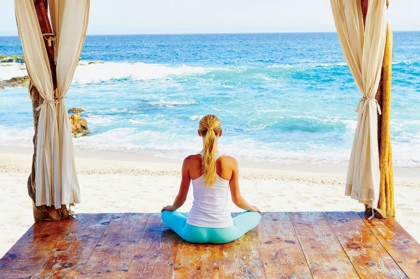
Going on holiday used to be all about excess – excess sleep, excess food, excess alcohol. But holidaymakers are now seeking something different, and using their time away to become healthier and happier.
Wellness tourism is booming. Recent figures show that $1 in every $7 spent on tourism goes on wellness pursuits – this translates to a market of about $480 billion, which is tipped to reach $750 billion by 2017.
Susie Ellis, chairman and CEO of Global Spa & Wellness Summit, believes this holiday about-face comes from “the rise in chronic diseases and obesity, the unprecedented 24/7 stress of modern life, and people’s increasingly diminished time off.
“These factors mean that what people want to achieve with travel is undergoing a sea change. Millions more each year are demanding destinations that deliver physical, emotional, spiritual and environmental health – along with enjoyment,” Ellis says.
What’s happening here?
On a local level, research suggests that even though Australians are seeking such experiences, the boom is more subdued within the domestic industry, which is likely due to our high Australian dollar.
A 2013 report on our wellness industry says Australia’s ageing population is set to ensure that demand for health and wellness tourism continues to build. However, it adds that destination spas in Australia “may not be the major beneficiaries of this”.
Instead it predicts that if the exchange value of the Australian dollar remains high, “consumers will likely be driven overseas to Bali, Fiji and Thailand for more affordable spa tourism in more exotic locations”.
Despite the challenges of our strong dollar, Sharon Kolkka, general manager of luxury Queensland retreat Gwinganna, says that since they opened eight years ago, they’ve seen a significant growth in the domestic interest for wellness holidays.
“Guests are seeking ways to feel better and enjoy their time off in different and more fulfilling ways,” Kolkka says. “Wellness tourism has the opportunity to provide something that can help us develop better health at a time of overload and high stress, with increasingly alarming statistics on blood pressure, heart disease and diabetes.”
Like Ellis, Kolkka predicts the concept will continue to grow as lifestyles become faster-paced and more technology-driven, and “wellness” gets harder to maintain.
Healthy revenue raisers
Research has pinpointed wellness tourists to be “high-yield” travellers who spend 130 per cent more than the average tourist. Seeing this revenue potential, major hotel brands that traditionally cater to higher-end business travellers are jumping on the wellness bandwagon. The Westin group, for example, has incorporated new health features such as a sports shoes “rental” program and running maps for guests.
“Guests know that keeping fit and eating healthily keeps them performing at their best,” Brian Povinelli, global brand leader for Westin Hotels & Resorts and Le Méridien, says. “So we’re ensuring that when they stay with us, they have the opportunity to leave feeling even healthier than when they arrived.”
There was a time when luxury wellness resort Chiva-Som, in Thailand, was one of a select group offering the intensive “total wellness” packages. Now such retreats are dotted around the globe and are no longer purely the domain of the wealthy.
Chiva-Som general manager Sheila McCann has noticed that as people become busier and more time-poor, they’re prepared to spend more on healthy eating options, varied exercise programs and expert health advice – and it’s not just the pampered rich who are checking in for a life detox.
“I’ve been in the spa and wellness industry for more than three decades,” McCann says. “During that time, many people have shifted from taking a more ‘indulgent’ approach of understanding treatments such as massage for their pampering benefits to understanding their full value in holistic wellness.”
She adds that people are starting to wake up to the fact that they need to take responsibility for their own wellness and kick-start a healthier way of living. And a good time – “often the only time” – to do this is while they’re on holiday.
The wellness retreats the body+soul team have recently loved:
- Editor Gemma: “Kamalaya in Thailand. It’s a stunning spot, and it specialises in life-changing programs and reboots.”
- Dep ed Liz: “Gwinganna in Queensland. I left better educated about nutrition and the staff were great.”
- Chief sub Katie: “Solar Springs in NSW. It’s not as intensive as others, but more about the escape.”
- Sub Lizza: “Billabong Retreat in NSW. It’s only an hour from Sydney but feels miles away, and has amazing vegetarian food.”
What’s your idea of a wellness getaway?
From luxe retreats to DIY breaks, there’s something to suit all tastes
Lifestyle and health retreats: These are aimed at people who are committed to improving their health and fitness. Many offer the full health package with an upfront cost that includes accommodation, three meals a day (often vegan or vegetarian), a daily program of fitness classes and workshops and some pampering.
Perfect for… those who want a 24/7 health and fitness itinerary.
Spa resorts: These holiday destinations are more about healthy relaxation. They’re often luxury resorts with facilities such as upmarket restaurants, gyms and leisure areas, and you pay extra for the first-class day spa treatment packages.
Perfect for… those wanting to unwind and indulge in luxury, with the option of exercise.
DIY health break: This involves you booking a place to stay, then making use of the local activities and dining options. You might do dailybushwalks, join a yoga program or sign up for surfing lessons, and self-cater with healthy foods.
Perfect for… families or those keen for a self-run health break.
Source: bodyandSoul
 We are sharing information for knowledge. Presented by. SocialDiary.Net
We are sharing information for knowledge. Presented by. SocialDiary.Net



